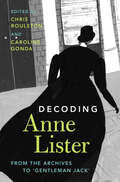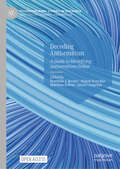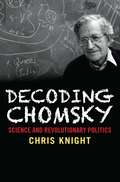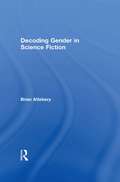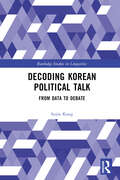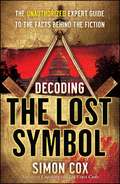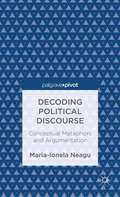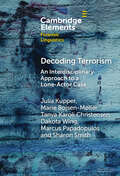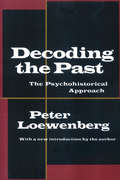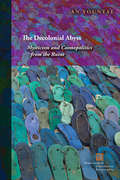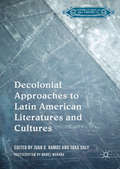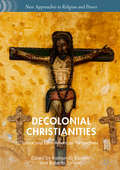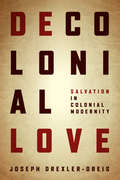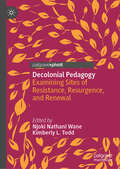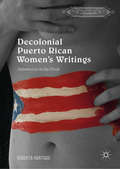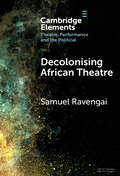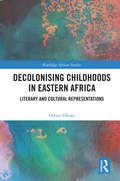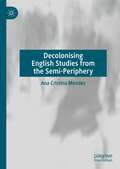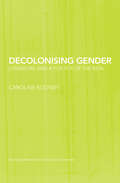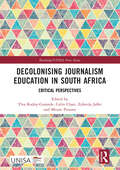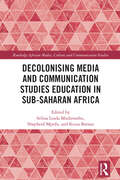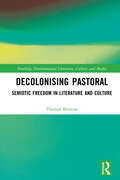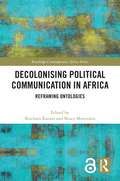- Table View
- List View
Decodable Stories Takehome Books, Blackline Masters, Level 2 [Grade 2]
by McGraw-HillNIMAC-sourced textbook
Decodable Stories Takehome Books Blackline Masters Level 3 [Grade 3]
by Wright Group Mcgraw HillNIMAC-sourced textbook
Decoding Anne Lister: From the Archives to ‘Gentleman Jack'
by Chris Roulston Caroline GondaThis is the first edited collection of essays on the nineteenth-century diarist Anne Lister. Now recognized as a UNESCO world heritage document, Lister's five-million-word diaries are paradigm-shifting in terms of their range of material, from social commentary and politics to breath-taking travel accounts. However, they have become most well-known for their explicit descriptions of same-sex practices, written in code and constituting a significant portion of their content. The essays here address the variety and interdisciplinarity of the diaries: Lister's negotiations with her own 'odd' identity, her multiple same-sex relationships, her involvement in politics and her lifelong thirst for knowledge. It also addresses Lister studies in popular culture through the successful Gentleman Jack BBC-HBO series, including an interview with Sally Wainwright and foreword by author Emma Donoghue. This title is part of the Flip it Open Programme and may also be available Open Access. Check our website Cambridge Core for details.
Decoding Antisemitism: A Guide to Identifying Antisemitism Online (Postdisciplinary Studies in Discourse)
by Matthias J. Becker Hagen Troschke Matthew Bolton Alexis ChapelanThis open access book is the first comprehensive guide to identifying antisemitism online today, in both its explicit and implicit (or coded) forms. Developed through years of on-the-ground analysis of over 100,000 authentic comments posted by social media users in the UK, France, Germany and beyond, the book introduces and explains the central historical, conceptual and linguistic-semiotic elements of 46 antisemitic concepts, stereotypes and speech acts. The guide was assembled by researchers working on the Decoding Antisemitism project at the Centre for Research on Antisemitism at Technische Universität Berlin, building on existing basic definitions of antisemitism, and drawing on expertise in various fields. Using authentic examples taken from social media over the past four years, it sets out a pioneering step-by-step approach to identifying and categorising antisemitic content, providing guidance on how to recognise a statement as antisemitic or not. This book will be an invaluable tool through which researchers, students, practitioners and social media moderators can learn to recognise contemporary antisemitism online – and the structural aspects of hate speech more generally – in all its breadth and diversity.
Decoding Chomsky: Science and Revolutionary Politics
by Chris KnightA fresh and fascinating look at the philosophies, politics, and intellectual legacy of one of the twentieth century's most influential and controversial minds Occupying a pivotal position in postwar thought, Noam Chomsky is both the founder of modern linguistics and the world's most prominent political dissident. Chris Knight adopts an anthropologist's perspective on the twin output of this intellectual giant, acclaimed as much for his denunciations of US foreign policy as for his theories about language and mind. Knight explores the social and institutional context of Chomsky's thinking, showing how the tension between military funding and his role as linchpin of the political left pressured him to establish a disconnect between science on the one hand and politics on the other, deepening a split between mind and body characteristic of Western philosophy since the Enlightenment. Provocative, fearless, and engaging, this remarkable study explains the enigma of one of the greatest intellectuals of our time.
Decoding Gender in Science Fiction
by Brian AtteberyFrom Frankenstein to futuristic feminist utopias, Decoding Gender in Science Fiction examines the ways science fiction writers have incorporated, explored, and revised conventional notions of sexual difference. Attebery traces a fascinating history of men's and women's writing that covertly or overtly investigates conceptions of gender, suggesting new perspectives on the genre.
Decoding Korean Political Talk: From Data to Debate (Routledge Studies in Linguistics)
by Sujin KangThis book offers an illuminating exploration into the complex world of political communication in South Korea from 2016 to 2021.Through an in-depth analysis of 34 political conversations totalling over 275 hours, this book presents a groundbreaking interdisciplinary study combining quantitative and qualitative methods. It delves into the intricate design and strategic use of questions and answers in political dialogue, shedding light on the underlying rhetoric, strategy, and power dynamics. By examining the seismic shifts in South Korea's political landscape, including a major political scandal, the impeachment of the president, North–South relations, and the COVID-19 pandemic, this work presents a unique perspective on how political conversations shape, and are shaped by, societal and global events. It is a vital contribution to the study of Korean linguistics, offering tools and frameworks for analyzing political dialogue in a political setting.An indispensable resource for scholars and students in the fields of linguistics, political science, communication studies, and Asian studies, as well as political enthusiasts and professionals engaged in diplomatic and governmental sectors. It offers readers insights into the nuanced strategies of political discourse, enhancing their understanding of how language shapes politics and vice versa.
Decoding The Lost Symbol: The Unauthorized Expert Guide to the Facts Behind the Fiction
by Simon CoxNow a Peacock Original TV series Secret societies. Forgotten history. Conspiracies. Now you can unlock the mysteries of Dan Brown&’s The Lost Symbol with this definitive and bestselling guide to the facts behind the fiction featuring Harvard symbologist Robert Langdon—from Simon Cox, author of Cracking the Da Vinci Code and Illuminating Angels and Demons.Dan Brown&’s thrilling novel The Lost Symbol again features Harvard symbologist Robert Langdon, this time in the US racing to uncover clues and crack codes involving secrets that are perpetuated to this day. But how much of the novel is true and what is pure fiction? Simon Cox, bestselling Dan Brown expert offers this definitive guide to all the mysteries featured in The Lost Symbol. Based on extensive research, this A-to-Z guide lists the real people, organizations, and themes featured in Dan Brown&’s novel, explains their histories and their meanings, reproduces and analyzes the symbols themselves, and provides insider knowledge gleaned from years of exhaustive study. From the monuments of Washington, DC, to the secrets of Salt Lake City and the hidden enclaves in Langley, Virginia, Cox knows where the facts are hidden about the Freemasons, Albert Pike, the Rosicrucians, the Founding Fathers, and more. This is the only resource you&’ll need to understand and enjoy the fascinating and mysterious world of The Lost Symbol.
Decoding Political Discourse: Conceptual Metaphors and Argumentation
by Maria-Ionela NeaguThis book provides an in-depth look into the cognitive and argumentative nature of political discourse with a focus on the role and place of conceptual metaphors in practical argumentation. Neagu's empirical investigation centres on the corpus of the American Presidential debates in 2008 and speeches by Barack Obama from 2009-2011.
Decoding Terrorism: An Interdisciplinary Approach to a Lone-Actor Case (Elements in Forensic Linguistics)
by Julia Kupper Marie Bojsen-Møller Tanya Karoli Christensen Dakota Wing Marcus Papadopulos Sharon SmithThis Element is an interdisciplinary analysis of the language evidence produced before, during and following a lone-actor terrorism attack in Halle, Germany, on October 9, 2019, resulting in two casualties. During his final preparations, the perpetrator, twenty-seven-year-old Stephan Balliet, announced his attack online and disseminated a targeted violence manifesto shortly before live-streaming his violent act. This post-hoc investigation introduces a multi-method approach that synchronizes well-established qualitative methodologies for forensic text analysis – genre, text linguistics, appraisal and uptake – to elucidate these data types. Furthermore, a retroactive threat assessment based on language data from the trial transcripts provides a holistic review of the assailant's background, red flags, triggering events and warning behaviors that could have signaled his movements along the pathway to violence. The results are considered in an organizational context to highlight current challenges faced by security agencies when mitigating the risk of lone-actors who radicalize in online environments.
Decoding the Past: The Psychohistorical Approach
by Peter LoewenbergIn Decoding the Past, Peter Loewenberg has collected eleven of his brilliant essays on psychohistory, a discipline that has emerged from the synthesis of traditional historical analysis and clinical psychoanalysis. He surveys this relatively new field its methods and its problems to show the special contributions that psychoanalysis can make to history. He then further explores the psychohistorical method by applying it to studies of personality, cultures, groups, and mass movements, demonstrating that psychohistory offers one of the most powerful of interpretive approaches to history.Decoding the Past is an impressive study that demonstrates the range of Loewenberg's own work in history and psychoanalysis and the full promise of an important and innovative methodology for others. His new essay takes up many of the criticisms and concerns raised about the method of psychohistory, and offers a cogent defense for its continued usage.
The Decolonial Abyss: Mysticism and Cosmopolitics from the Ruins (Perspectives in Continental Philosophy)
by An YountaeThe Decolonial Abyss probes the ethico-political possibility harbored in Western philosophical and theological thought for addressing the collective experience of suffering, socio-political trauma, and colonial violence. In order to do so, it builds a constructive and coherent thematization of the somewhat obscurely defined and underexplored mystical figure of the abyss as it occurs in Neoplatonic mysticism, German Idealism, and Afro-Caribbean philosophy.The central question An Yountae raises is, How do we mediate the mystical abyss of theology/philosophy and the abyss of socio-political trauma engulfing the colonial subject? What would theopoetics look like in the context where poetics is the means of resistance and survival? This book seeks to answer these questions by examining the abyss as the dialectical process in which the self’s dispossession before the encounter with its own finitude is followed by the rediscovery or reconstruction of the self.
Decolonial Approaches to Latin American Literatures and Cultures
by Juan G. Ramos Tara DalyDecolonial Approaches to Latin American Literatures and Cultures engages and problematizes concepts such as "decolonial" and "coloniality" to question methodologies in literary and cultural scholarship. While the eleven contributions produce diverse approaches to literary and cultural texts ranging from Pre-Columbian to contemporary works, there is a collective questioning of the very idea of "Latin America," what "Latin American" contains or leaves out, and the various practices and locations constituting Latinamericanism. This transdisciplinary study aims to open an evolving corpus of decolonial scholarship, providing a unique entry point into the literature and material culture produced from precolonial to contemporary times.
Decolonial Christianities: Latinx and Latin American Perspectives (New Approaches to Religion and Power)
by Raimundo Barreto Roberto SirventWhat does it mean to theorize Christianity in light of the decolonial turn? This volume invites distinguished Latinx and Latin American scholars to a conversation that engages the rich theoretical contributions of the decolonial turn, while relocating Indigenous, Afro-Latin American, Latinx, and other often marginalized practices and hermeneutical perspectives to the center-stage of religious discourse in the Americas. Keeping in mind that all religions—Christianity included—are cultured, and avoiding the abstract references to Christianity common to the modern Eurocentric hegemonic project, the contributors favor embodied religious practices that emerge in concrete contexts and communities. Featuring essays from scholars such as Sylvia Marcos, Enrique Dussel, and Luis Rivera-Pagán, this volume represents a major step to bring Christian theology into the conversation with decolonial theory.
Decolonial Love: Salvation in Colonial Modernity
by Joseph Drexler-DreisBringing together theologies of liberation and decolonial thought, Decolonial Love interrogates colonial frameworks that shape Christian thought and legitimize structures of oppression and violence within Western modernity. In response to the historical situation of colonial modernity, the book offers a decolonial mode of theological reflection and names a historical instance of salvation that stands in conflict with Western modernity. Seeking a new starting point for theological reflection and praxis, Joseph Drexler-Dreis turns to the work of Frantz Fanon and James Baldwin. Rejecting a politics of inclusion into the modern world-system, Fanon and Baldwin engage reality from commitments that Drexler-Dreis describes as orientations of decolonial love. These orientations expose the idolatry of Western modernity, situate the human person in relation to a reality that exceeds modern/colonial significations, and catalyze and authenticate historical movement in conflict with the modern world-system. The orientations of decolonial love in the work of Fanon and Baldwin—whose work is often perceived as violent from the perspective of Western modernity—inform theological commitments and reflection, and particularly the theological image of salvation.Decolonial Love offers to theologians a foothold within the modern/colonial context from which to commit to the sacred and, from a historical encounter with the divine mystery, face up to and take responsibility for the legacies of colonial domination and violence within a struggle to transform reality.
Decolonial Pedagogy: Examining Sites of Resistance, Resurgence, and Renewal
by Njoki Nathani Wane Kimberly L. ToddThrough innovative and critical research, this anthology inquires and challenges issues of race and positionality, empirical sciences, colonial education models, and indigenous knowledges. Chapter authors from diverse backgrounds present empirical explorations that examine how decolonial work and Indigenous knowledges disrupt, problematize, challenge, and transform ongoing colonial oppression and colonial paradigm. This book utilizes provocative and critical research that takes up issues of race, the shortfalls of empirical sciences, colonial education models, and the need for a resurgence in Indigenous knowledges to usher in a new public sphere. This book is a testament of hope that places decolonization at the heart of our human community.
Decolonial Puerto Rican Women's Writings: Subversion in the Flesh (Literatures of the Americas)
by Roberta HurtadoThis book explores representations of sentient-flesh — flesh that holds consciousness of being — in Puerto Rican women’s literature. It considers how different literary devices can participate in the decolonization of the flesh as it is obfuscated by mappings of the 'body' from the Enlightenment era and colonial endeavors. Drawing on studies of cognitive development and epigenetics to identify how sentient-flesh creates knowledge of power and navigates methods of subversion for social justice, this book grapples with the question of how Puerto Rican women, living in the nation of their colonizer, manifest an identity that exists beyond the scope of colonization. It makes the case for a change in perspective that illustrates the conceptual shift from survivors to thrivers to educators. To do so, it draws upon Cherríe Moraga and Gloria Anzaldúa’s theory in the flesh; Iris Lopez’s theories of trauma-knowledge; and María Lugones’s concept of 'world travelers' to retain the corporeal flesh and physical location in Latinas’ attempts to write subversion under U.S. colonization across racial, cultural, and ethnic boundaries, as well as the gendered-sexuality barriers identified by Emma Pérez. This project builds on their work to frame Latina literature within a new discussion of how corporeal, memory, and sentient experiences of identity must center sentient-flesh as the source of decolonial consciousness rather than relapsing into discourses of the 'body'.
Decolonising African Theatre (Elements in Theatre, Performance and the Political)
by Samuel RavengaiDecolonisation can be pursued in different ways. After many years of developing a critical language to engage coloniality, the most urgent need in African theatre is to develop new theories and methods in our manufactories. This Element uses Afroscenology as a theory to read and comment on African theatre. The Element particularly focuses on the history of laboratories in which it was tested and emerged, the historicization of rombic theatre and the crafting of a theory of the playtext which has been named theatric theory to distinguish it from the Aristotelian dramatic theory. The second dimension of the theory is the performatic technique. This Element also explain Afrosonic mime through examples drawn from the workshops conducted in training performers.
Decolonising Childhoods in Eastern Africa: Literary and Cultural Representations (Routledge African Studies)
by Oduor OburaThis book deconstructs Eurocentric narratives and showcases local voices to re-examine childhood in Eastern Africa. Moving away from portrayals of eastern African childhood as characterised by want, the author argues for a differentiated and pluralist nature of the eastern African childhood. Taking a chronological approach, the author provides a multidisciplinary critical reading of Africanist research on childhood in eastern Africa, drawing from anthropological and cultural studies, while examining writings from the pre-imperial and colonial periods. Moving into the contemporary period, the book reveals the continuity, tensions and ruptures of these portrayals in humanitarian, legal, and journalistic discourses, before exploring postcolonial writings on childhood in works by Eastern African novelists. Based on such a multidisciplinary perspective, this book will be of interest to scholars of African literature, eastern African history, critical childhood studies, museums and Africanist epistemologies.
Decolonising English Studies from the Semi-Periphery
by Ana Cristina MendesThis book investigates how decolonising the curriculum might work in English studies — one of the fields that bears the most robust traces of its imperial and colonial roots — from the perspective of the semi-periphery of the academic world- system. It takes the University of Lisbon as a point of departure to explore broader questions of how the field can be rethought from within, through Anglophone (post)coloniality and an institutional location in a department of English, while also considering forces from without, as the arguments in this book issue from a specific, liminal positionality outside the Anglosphere. The first half of the book examines the critical practice of and the political push for decolonising the university and the curriculum, advancing existing scholarship with this focus on semi-peripheral perspectives. The second half comprises two theoretically-informed and classroom-oriented case studies of adaptation of the literary canon, a part of model syllabi that are designed to raise awareness of and encourage an understanding of a global, pluriversal literary history.
Decolonising Gender: Literature and a Poetics of the Real (Routledge Research in Postcolonial Literatures)
by Caroline RooneyThrough examination of the functions of language and cross-cultural readings of literature – from African queer reading to postcolonial Shakespeare – Rooney explores the nature of the real, providing: a way out of some of the current deadlocks of feminist theory an anti-essentialist approach to gender in which both male and female readers may address a consciousness of the feminine a platform for postcolonial and postmodernist thinkers to engage in a dialogue around the status of the performative in regard to the other a new theory of poetic realism in both canonical and postcolonial literatures a re-reading of the Enlightenment legacy in terms of postcolonial liberation theory a comparison of contemporary debates on the real across the humanities and the sciences. Exploring current ideas of performativity in literature and language, and negotiating a path between feminist theory’s common pitfalls of essentialism and constructivism, Caroline Rooney argues convincingly that by rethinking our understanding of gender we might also equip ourselves to resist racism and totalitarianism more effectively.
Decolonising Journalism Education in South Africa: Critical Perspectives (Routledge/UNISA Press Series)
by Ylva Rodny-Gumede Colin Chasi Zubeida Jaffer Mvuso PononoThis book is the culmination of several years of collaborative work. It is a unique contribution to the field of journalism because of the depth and variety of contributions it makes to the field. The scholars who contribute to this volume respond to the great need to rethink journalism from various perspectives including journalism training, research, the contents of the news media, language, media ethics, the safety of journalists and gender inequities in the news media. In doing this, they recognise how the societies that journalism address should themselves change.
Decolonising Media and Communication Studies Education in Sub-Saharan Africa (Routledge African Media, Culture and Communication Studies)
by Selina Linda Mudavanhu Shepherd Mpofu Kezia BatisaiThe book provides insights on decolonising media and communication studies education from diverse African scholars at different stages of their careers. These academics, located on the continent and in the diaspora, share an interest in decolonising higher education broadly and media and communication studies teaching and learning in particular. Although many African countries gained flag independence from different European colonial powers between the 1950s and the 1970s, this book argues that former colonies remain ensnared in a colonial power matrix. Many African universities did not jettison ways of teaching and learning established during colonialism, and even those journalism, communication, and media studies training programmes which were established after the attainment of flag independence did not place decolonial agendas at the front and centre when setting them up. Starting with big picture thematic questions around decolonisation, the book goes on to consider what the implications of change would be for students and instructors, before reflecting on how far it is possible to decolonise curricula and syllabi and what this might look like in practice across a range of subject areas and country contexts. Overall, this book presents a nuanced picture of what a decolonised media and communication studies education could look like in sub-Saharan Africa. This book is essential for researchers in Africa in disciplines such as media and communication studies, journalism, film studies, cultural studies, and higher education studies. More broadly, the concepts and ideas on decolonising teaching and learning discussed in the book are relevant to instructors in any discipline who are interested in doing the decolonial work of contesting coloniality.
Decolonising Pastoral: Semiotic Freedom in Literature and Culture (Routledge Environmental Literature, Culture and Media)
by null Thomas BristowThis book offers an interdisciplinary exploration of pastoral, a genre that has captured the Western imagination for centuries, across literature, art and music. Combining the practices of literary criticism and creative writing, Decolonising Pastoral develops a new series of tools for the project of the environmental humanities. With an emphasis on subjectivity and experience, essays and fictocriticism are woven with scholarship and stories to create a fresh critical framework. Six chapters focus on laying out a new synthetic methodology, taking readers on a journey across literary genres, forms and modes, to explore nature both as an organic totality that encompasses mind and matter, and as a source of cultural expression and production. Beginning with an introduction to biosemiotics, the text progresses onto the blue humanities, synthetic criticism and metrics for decolonising pastoral, before uniting the threads together. It discusses works from diverse writers such as Thea Astley, Judith Wright, Ted Banfield, Xavier Herbert, Alexis Wright, Sylvia Plath, T.S. Eliot, Seamus Heaney, W.H. Auden, Percy Bysshe Shelley, William Wordsworth, William Blake, John Milton and William Shakespeare.This ambitious and experimental methodology, developing where creative writing and literary criticism meet, will be an important read for scholars, researchers and students interested in literature, ecology, environmental studies and language.
Decolonising Political Communication in Africa: Reframing Ontologies (Routledge Contemporary Africa)
by Beschara Karam Bruce MutsvairoThis book uses decolonisation as a lens to interrogate political communication styles, performance, and practice in Africa and the diaspora. The book interrogates the theory and practice of political communication, using decolonial research methods to begin a process of self-reflexivity and the creation of a new approach to knowledge production about African political communication. In doing so, it explores political communication approaches that might until recently have been considered subversive or dissident: forms of political communication that served to challenge imposed western norms and to empower African citizens and their histories. Centring African scholarship, the book draws on case studies from across the continent, including Zimbabwe, South Africa, Nigeria and Ghana. This book will be of interest to students and scholars of politics, media and communication in Africa.

